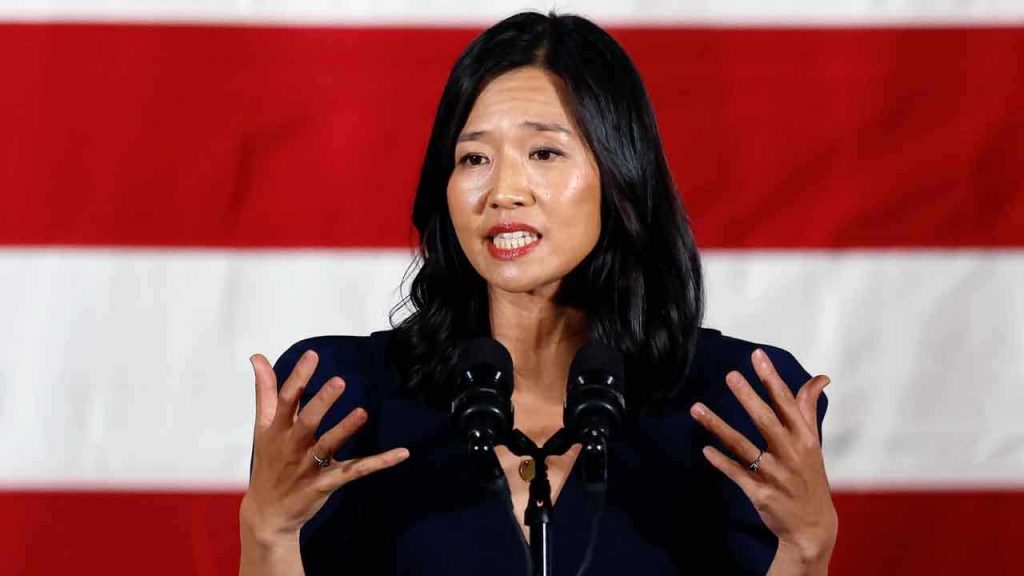Boston Mayor Responds to Trump’s Threat to Pull World Cup Games
In a recent exchange that has caught national attention, Boston Mayor Michelle Wu has responded to former President Donald Trump’s threats to have FIFA World Cup matches moved from Boston in 2025. This situation highlights the intersection of sports, politics, and local governance as Boston prepares to welcome one of the world’s most prestigious sporting events. The city is currently scheduled to host seven World Cup matches, including five group-stage games, a Round of 32 fixture, and a quarterfinal on July 9, positioning Boston as a significant venue in the North American tournament.
Mayor Wu’s response was measured and focused on Boston’s readiness for the international spotlight: “Boston is honored and excited to host World Cup matches, and we look forward to welcoming fans from around the world to our beautiful city, the cradle of liberty and city of champions.” Her statement emphasizes the city’s historical significance and sporting tradition rather than engaging directly with Trump’s criticisms. This approach reflects an effort to keep the focus on Boston’s preparations for the tournament while avoiding escalating political tensions that could overshadow the event’s significance for the city.
Trump’s threats emerged following a disturbing incident in Boston on October 5, when approximately 100 people participated in an illegal street takeover in the early morning hours. According to the Boston Police Department, the situation turned violent when participants attacked police cruisers with fireworks, cones, poles, and other items. One police vehicle was reportedly set on fire and had to be towed away. Speaking to reporters, Trump suggested he would contact FIFA President Gianni Infantino to have games moved from Boston, saying, “We can take them away. I love the people of Boston. And I know the games are sold out, but the mayor is not good.” He characterized Mayor Wu as “intelligent, but radical left,” adding that if he felt there were “unsafe conditions,” he would request FIFA move the matches to another location.
The street takeover incident that sparked this controversy represents a broader challenge facing urban areas across America. Such events, often organized through social media, involve large groups temporarily seizing control of public spaces for illegal activities like street racing, creating significant public safety concerns. Massachusetts Governor Maura Healey addressed the situation with firm language, stating, “I’m committed to doing everything I can to get after this issue. That’s my message today: No more. Not going to happen here. And if you do it, you’re going to be punished. I’m serious.” Her response underscores the state-level commitment to maintaining order and safety, particularly as Boston prepares for increased international attention during the World Cup.
This political friction comes at a delicate time for Boston, as the city balances preparations for hosting international visitors with addressing urban safety concerns. The World Cup represents not just a sporting event but a significant economic opportunity, with potential tourism revenue and global visibility that could benefit the region for years to come. Local businesses, hotels, and restaurants have been preparing for the influx of international visitors, and the suggestion that games could be moved raises concerns about these economic investments. At the same time, the incident that prompted Trump’s comments highlights legitimate public safety challenges that the city must address to ensure a successful tournament.
The situation reflects the complex interplay between sports, politics, and governance in contemporary America. FIFA, as the governing body of international soccer, typically avoids direct political entanglements, focusing instead on technical and logistical considerations for host cities. While Trump suggested FIFA President Infantino would move games “very easily” at his request, such decisions involve complex contractual obligations and extensive planning that has been underway for years. As Boston continues its preparations to welcome the world in 2025, this episode serves as a reminder of how global sporting events can become focal points for broader political and social discussions, highlighting both challenges and opportunities for host cities on the international stage.


